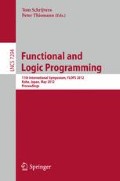Abstract
We propose a typed lambda calculus based on Avron’s hypersequent calculus for Gödel–Dummett logic. This calculus turns out to model waitfree computation. Besides strong normalization and non-abortfullness, we give soundness and completeness of the calculus against the typed version of waitfree protocols. The calculus is not only proof theoretically interesting, but also valuable as a basis for distributed programming languages.
Access this chapter
Tax calculation will be finalised at checkout
Purchases are for personal use only
Preview
Unable to display preview. Download preview PDF.
References
Abramsky, S.: Computational interpretations of linear logic. Theo. Comp. Sci. 111(1-2), 3–57 (1993)
Avron, A.: Hypersequents, logical consequence and intermediate logics for concurrency. Ann. Math. Artif. Intell. 4, 225–248 (1991)
Avron, A.: The method of hypersequents in the proof theory of propositional non-classical logics, pp. 1–32. Clarendon Press (1996)
Baaz, M., Ciabattoni, A., Fermüller, C.: A natural deduction system for intuitionistic fuzzy logic. In: Lectures on Soft Computing (2001)
Balat, V., Di Cosmo, R., Fiore, M.: Extensional normalisation and type-directed partial evaluation for typed lambda calculus with sums. SIGPLAN Not. 39(1), 64–76 (2004)
Biran, O., Moran, S., Zaks, S.: A combinatorial characterization of the distributed tasks which are solvable in the presence of one faulty processor. In: PODC 1988, pp. 263–275. ACM (1988)
Borowsky, E., Gafni, E.: Immediate atomic snapshots and fast renaming. In: PODC 1993, pp. 41–51. ACM (1993)
Ciabattoni, A., Galatos, N., Terui, K.: From axioms to analytic rules in nonclassical logics. In: LICS 2008, pp. 229–240. IEEE (2008)
Dummett, M.: A propositional calculus with denumerable matrix. J. Symb. Logic 24(2), 97–106 (1959)
Fermüller, C.G.: Parallel Dialogue Games and Hypersequents for Intermediate Logics. In: Cialdea Mayer, M., Pirri, F. (eds.) TABLEAUX 2003. LNCS, vol. 2796, pp. 48–64. Springer, Heidelberg (2003)
Fournet, C., Gonthier, G.: The Join Calculus: A Language for Distributed Mobile Programming. In: Barthe, G., Dybjer, P., Pinto, L., Saraiva, J. (eds.) APPSEM 2000. LNCS, vol. 2395, pp. 268–332. Springer, Heidelberg (2002)
Gentzen, G.: Investigations into logical deduction. American Philosophical Quarterly 1(4), 288–306 (1964)
de Groote, P.: On the Strong Normalisation of Intuitionistic Natural Deduction with Permutation-Conversions. Information and Computation 178(2), 441–464 (2002)
Herlihy, M.: Impossibility and universality results for wait-free synchronization. In: PODC 1988, pp. 276–290. ACM (1988)
Hirai, Y.: An Intuitionistic Epistemic Logic for Sequential Consistency on Shared Memory. In: Clarke, E.M., Voronkov, A. (eds.) LPAR-16 2010. LNCS, vol. 6355, pp. 272–289. Springer, Heidelberg (2010)
Honda, K., Tokoro, M.: An Object Calculus for Asynchronous Communication. In: America, P. (ed.) ECOOP 1991. LNCS, vol. 512, pp. 133–147. Springer, Heidelberg (1991)
Milner, R.: Communicating and mobile systems: the pi-calculus. Cambridge University Press (1999)
Moran, S.: Extended impossibility results for asynchronous complete networks. Information Processing Letters 26(3), 145–151 (1987)
Saks, M., Zaharoglou, F.: Wait-free k-set agreement is impossible: the topology of public knowledge. In: STOC 1993, pp. 101–110. ACM (1993)
Sørensen, M.H., Urzyczyn, P.: Lectures on the Curry–Howard isomorphism. Elsevier (2007)
Author information
Authors and Affiliations
Editor information
Editors and Affiliations
Rights and permissions
Copyright information
© 2012 Springer-Verlag Berlin Heidelberg
About this paper
Cite this paper
Hirai, Y. (2012). A Lambda Calculus for Gödel–Dummett Logic Capturing Waitfreedom. In: Schrijvers, T., Thiemann, P. (eds) Functional and Logic Programming. FLOPS 2012. Lecture Notes in Computer Science, vol 7294. Springer, Berlin, Heidelberg. https://doi.org/10.1007/978-3-642-29822-6_14
Download citation
DOI: https://doi.org/10.1007/978-3-642-29822-6_14
Publisher Name: Springer, Berlin, Heidelberg
Print ISBN: 978-3-642-29821-9
Online ISBN: 978-3-642-29822-6
eBook Packages: Computer ScienceComputer Science (R0)

